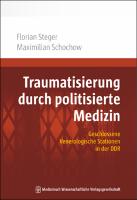Traumatisierung durch politisierte Medizin
Geschlossene Venerologische Stationen in der DDR
Author(s)
Steger, Florian
Schochow, Maximilian
Language
GermanAbstract
In the GDR, girls and women from the age of twelve were forced into closed venereological wards. The medical treatments and the stay in the wards led to severe traumatization of the forced inmates. Just the suspicion of an STD or a denunciation was enough to be brought to such a station by the police or the home management. Political medicine in the wards interfered with the physical integrity of the girls and women without the information and consent of those who had been sent to the hospital. Even though 70 percent of them were shown not to have an STD, all girls and women had to undergo a gynecological examination every day. In some stations, the forced instruction had to do the work. In other stations, the girls and women were asylum-seekers and isolated from the outside world. In a hierarchically organized terror system, the interned were physically and psychologically humiliated and traumatized. These traumatizations were passed on transgenerationally. Using the example of Berlin, Berlin-Buch, Dresden, Halle (Saale) and Leipzig, the emergence of the stations in the Soviet occupation zone, everyday life in the closed venerological stations and the traumatic consequences of the compulsory admissions are described. In addition to extensive archive research, the authors conducted interviews with former forced inmates as well as with doctors, nurses and employees of the closed venereological stations for this reconstruction.
Keywords
traumatisation; GDR; closed ward; politicization of medicine; venerologyDOI
10.32745/9783954664559Publisher website
https://www.mwv-berlin.de/Publication date and place
Berlin, 2015Classification
History of medicine


 Download
Download